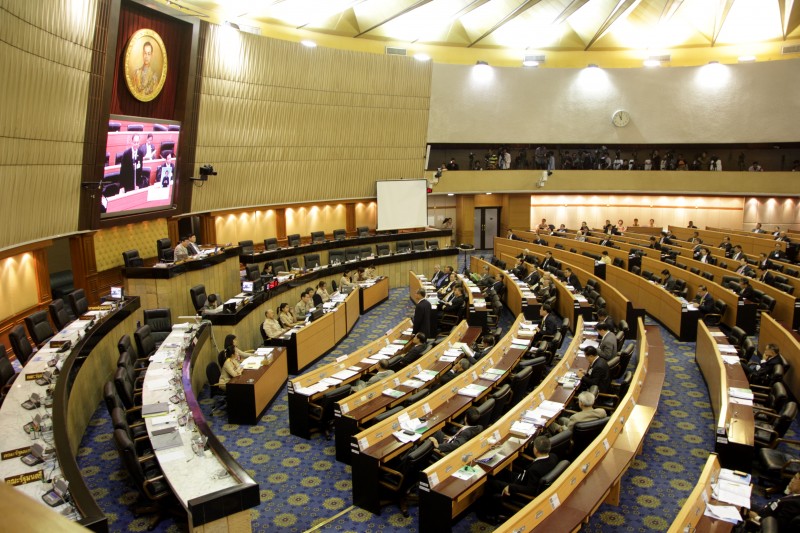
Thailand's military-appointed National Legislative Assembly in session. The body will deliberate the ten digital economy bills submitted by the Cabinet. Photo by John Vincent, Copyright @Demotix (1/16/2015)
The military-backed government of Thailand has introduced ten digital economy bills which some activists say could violate the human rights of Internet users and mobile phone subscribers in the country.
Government officials say the proposed bills are necessary to make Thailand more competitive and better equipped to compete in the global digital economy. But for some civil society organizations, the draft bills are “national security bills in disguise” that could further curtail the rights of Thai citizens.
Thailand’s army grabbed power last May, enacted an interim constitution, imposed restrictive media laws, and banned public protests.
In a Cabinet meeting in early January 2015, the government shocked many when it announced plans to pass ten Internet-related laws this year, some of which seek to update existing laws like the Computer-related Crime Aill. The aforementioned laws include the following:
1. National Digital Committee for Economy and Society Bill
2. Ministry of Digital for Economy and Society Bill
3. Electronic Transaction Bill (amendment)
4. Computer-related Crime Bill (amendment)
5. Cybersecurity Bill
6. Personal Data Protection Bill
7. Digital Economy Promotion Bill
8. Digital Development for Economy and Society Fund Bill
9. Broadcasting and Telecommunication Regulator Bill (amendment)
10. Electronic Transaction Development Agency Bill (amendment)
For the Thai Netizen Network, a Bangkok-based digital rights group, many provisions in these pending bills “allow the authorities to search, confiscate, have access to and intercept communications without any check and balance from any credible judicial authority and in some cases, these acts can be conducted without strong evidence.”
The group warned that the government’s proposed laws will violate freedom of expression, the right to privacy and the right to personal information, and “will affect the confidence of the operators of businesses related to information and communication.”
Many activists have pointed out that Article 35 of the Cyber Security Bill would give broad snooping powers to authorities, allowing them to conduct electronic surveillance without being held accountable to any judicial entity. The provision states that officials have the power to:
…gain access to information on communications, either by post, telegram, telephone, fax, computer, any tool or instrument for electronic media communication or telecommunications, for the benefit of the operation for the maintenance of Cybersecurity.
While data interception was already included in the 2007 Computer Crimes Act, the proposed amendment “will expand the scope of this Article to allow it to be used for other non-computer-related crimes investigation as well.” Another issue at stake is the undermining of personal data protection under the Protection of Personal Information bill.
The Thai Netizen Network was joined by other civil society networks such as FTA Watch, Foundation for Community Education Media, Green World Foundation, People’s Media Development Institute, and Thailand Association for the Blind in rejecting the amendment, arguing that it will “pave the way for a state monopoly of the telecommunication business.”
An online petition was launched opposing these bills. As of this writing, 18,000 have already signed it. The petitioners pointed out that “the three seats for consumer rights representatives were cut and replaced with two seats for national security representatives.”
For its part, the government admitted that it rushed the drafting of these so-called digital economy bills and it may have made several mistakes in some of the documents. Surangkana Wayuparb, chief executive of the Electronic Transactions Development Agency, assured the public that the government does not intend to use the proposed laws to suppress the political rights of citizens.
While it is important for Thailand to adopt new laws and policies related to digital economy, it must be done in a transparent manner and in consultation with all stakeholders. The government should also listen to the petition of various human rights groups to reform or repeal existing laws that restrict free speech.




1 comment
私は確かにこのアドバイスのように、私はあなたがここに掲載のものの運命に感謝していませんでした。私はそれに配位これらのトピックとトピックに関してより多くの最新情報をahve。一部の人々は、それは執念深い今日のポリシーであるものであることを発見してい撤退のための適度に緩やかな、その上に英語が、私をunderstadnするかもしれません。こんにちは